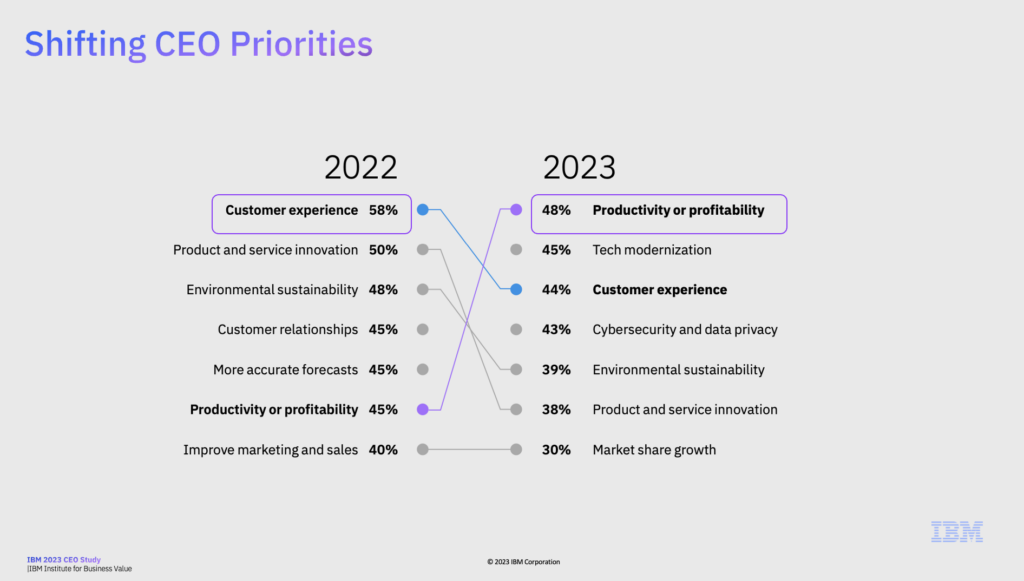
Technology modernization jumps to the top of the agendas as CEOs in ASEAN look to embrace generative AI. (Source – Shutterstock)
2023 IBM Study: CEOs want Generative AI adoption
When Mark Zuckerberg announced the metaverse some time ago, there was much hype in the industry. A lot of organizations were looking at ways they could implement or be part of it. Some companies even went as far as investing in virtual real estate in the metaverse while others spend a huge fortune in designing 3D worlds.
There was one problem though. Using the metaverse was not as simple as initially portrayed. From a lack of wearables to poor designs, metaverses never really reached the heights predicted. In fact, apart from gamification, many users still preferred offline use cases. The metaverse was never really able to improve productivity and most employees found it a waste of time to go back to the office just to work in a virtual world.
Just as the metaverse hype was fading away, innovations in AI started making headlines. Generative AI, which is the biggest AI breakthrough currently, has taken over the world by storm.
Unlike the metaverse, generative AI could be implemented into a variety of use cases that can actually improve and enhance the working experience. Be it automating processes, preparing email drafts, analyzing data, planning a work schedule, or even creating a new business profile picture, generative AI became highly sought after by almost all businesses in every industry across the world.
According to IBM’s 2023 CEO study, half (50%) of CEOs surveyed report they are already integrating generative AI into digital products and services. The study — themed CEO decision-making in the age of AI — surveyed around 3000+ CEOs across 30+ countries (including Malaysia) and 24 key industries.
From the study, IBM sees that CEO decision-making is not what it used to be. And in an environment that has many CEOs feeling torn between urgency and uncertainty, generative AI changes—well, everything. As a whole, the 2023 CEO Study revealed how CEOs are making decisions in this new environment, what they identify as their top priorities and challenges, and what sets apart a select group that is producing results well ahead of their peers. AI has changed the mindset of business leaders, from “adding AI” to “Start with AI”.
The report also highlighted that while CEOs see tremendous potential in generative AI, other executives have limited confidence in their company’s readiness. The findings showed that:
- 75% of CEOs surveyed believe the organization with the most advanced generative AI will have a competitive advantage.
- 50% of CEOs report they are already integrating generative AI into products and services; 43% say they are using generative AI to inform strategic decisions, with 36% using the technology for operational decisions.
- While 69% of CEO respondents see broad benefits of generative AI across their organization, just 29% of their executive teams agree they have the in-house expertise to adopt generative AI.
- Only 30% of non-CEO senior executives surveyed say that their organization is ready to adopt generative AI responsibly.
AI adoption for ASEAN CEOs a priority

Catherine Lian, Managing Director of IBM Malaysia
Interestingly, the views are pretty much the same for all the CEOs globally. Statistics from ASEAN CEOs in the survey indicated that 50% of ASEAN pinpoint technology modernization as a top priority for their organization followed by enhancing productivity (48%) and customer experience (48%) tied as their second highest priority among their top challenges. The CEOs feel that technology factors are the top external force impacting their organization over the next three years.
According to Catherine Lian, Managing Director of IBM Malaysia, there has been a shift in the priority of technology adoption among ASEAN businesses this year as compared to last year. In 2022, CEOs indicated improving customer experience as the main priority for investing in new technologies. And this made sense given that some countries were still coping with the pandemic.
However in 2023, with economies expanding and hoping to go back to pre-pandemic levels, companies are also fast-tracking their productivity. Hence, it only makes sense for business leaders to shift their focus to technology modernization to improve both productivity and the customer experience as well.
“In Malaysia, the financial services industry, telcos and aviation companies are leading the AI adoption followed by the manufacturing industry. And AI adoption makes sense because this is how these industries would serve a populated society. It’s all about meeting customer requirements, increasing productivity and profitability. Malaysian government agencies also have a lot of will to drive AI adoption but it depends on the people and process,” explained Lian.
Lian also highlighted that SMEs are also increasing their AI adoption but are investing in the technology based on their capacity. Interestingly, she also mentioned that multinational corporations are leading the AI adoption and local companies still have a lot to do to catch up. This is possibly due to the process of adopting AI whereby companies need to ensure that the regulation and adoption come hand in hand.

A change of focus for AI adoption. (Source – IBM)
Top barrier to AI adoption
“Effective decision-making is a combination of data, human judgment and people’s opinions. The best decisions are those where collaboration informs the process. However, CEOs are drawn to inputs that promise to simplify or accelerate decision-making, such as data-driven, AI-powered tools. It may be tempting for enterprise leaders to see generative AI as their magic wand,” stated the report.
Moreover, the report also highlights that as CEOs respond to the pressure to accelerate AI adoption, their teams are more hesitant. CEOs firmly believe in the benefits of generative AI across their organizations but other executives cite a lack of in-house skills. CEOs (74%) agree or strongly agree that their team has the knowledge and skills to incorporate new technologies such as generative AI. And as highlighted earlier, just 29% of other executives, though, agree that their organization already has the expertise in-house to adopt generative AI and only 30% agree that their organization is ready to adopt generative AI responsibly.
At the same time, when CEOs struggle over adopting generative AI, their first concern is data. Without trusted, reliable data, even the best AI will deliver faulty or biased. In fact, data is useful for business strategy only when protected – and importantly, its context, content and quality can be trusted. Hence, the need for data governance becomes even more pressing.
Another barrier is ensuring the availability and accessibility of data across departments in the organization is one of the most prominent hurdles. For many enterprises, it’s one that is far from complete. This siloed approach to data management limits the ability to gain a holistic view of business operations and seamless data harmonization and impedes efficient decision-making.
Data concerns, however, reach beyond generative AI. Organizations have faced data challenges for years. The best CEOs know that, while not glamorous, fixing data shortcomings is an essential priority for a competitive advantage.
- 61% are concerned about data lineage or provenance
- 57% are concerned about the security of data
- 53% are constrained by regulation/compliance
Overall, the main data challenges for organizations include unclear data calculation and reporting across suppliers/partners, difficulty identifying meaningful insights, unclear data calculation and reporting in the organization, inconsistent standards/ formats/ frequencies across datasets and poor visibility into the data source and quality.
As the report puts it, “The emergence of generative AI as a business and decision-making tool is a defining moment. The choice? To be a passive consumer or a wise AI value creator. CEOs need to define a clear plan and charge ahead, have the right capabilities in place, and handle disruptions of all shapes and sizes without slowing down or losing focus on strategic vision. Leaders can’t be distracted by shiny objects, lured down dark alleys, tempted by easy fixes, or lulled into complacency.”
READ MORE
- Data Strategies That Dictate Legacy Overhaul Methods for Established Banks
- Securing Data: A Guide to Navigating Australian Privacy Regulations
- Ethical Threads: Transforming Fashion with Trust and Transparency
- Top 5 Drivers Shaping IT Budgets This Financial Year
- Beyond Connectivity: How Wireless Site Surveys Enhance Tomorrow’s Business Network


